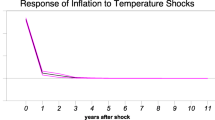Abstract
Climate change is a global phenomenon. Its impact on economic growth must therefore be analyzed in accordance with its (time-varying) common effects. We present an econometric analysis that evaluates this effect taking into account its global nature. Contrary to previous evidence that ignores the global effects, we obtain that the rising temperature has not decreased growth in real GDP per capita in the second half of the twentieth century for the world countries. However, we obtain a negative effect of rising temperatures and a positive effect of rising precipitation in poor countries. This positive effect of rising precipitation is also confirmed for hot and temperate countries.

Similar content being viewed by others
Notes
We have also performed tests without trends and results are confirmed. We should be clear that the non-stationary empirical strategy that we are following is appropriate to deal with empirical applications in which just some of the variables are non-stationary (see, e.g., Eberhardt and Teal 2011).
There are however a number of countries with positive significant signs. Those are Belize, Dominican Republic, El Salvador, Haiti, Mauritania, Mozambique, Nigeria, Sierra Leone, Uganda in the regression of column 1 and Argentina, Dominican Republic, Germany, Jordan, Mozambique, and Saudi Arabia.
References
Banks AS, Wilson K (2015) Cross-national time-series data archive. Databanks International, Jerusalem. Available at http://www.databanksinternational.com
Banerjee A, Carrion-i-Silvestre J (2011) Testing for panel cointegration using common correlated effects estimators. Paper presented at the 14th Applied Economics Meeting, Huelva
Barreca A, Clay K, Deschenes O, Greenstone M, Shapiro J (2013) Adapting to climate change: the remarkable decline in the U.S. temperature-mortality relationship over the 20th Century. NBER Working Paper, 18692
Bailey N, Kapetanios G, Pesaran MH (2016) Exponent of Cross? Sectional Dependence: Estimation and Inference. J Appl Econ 31:929–960. https://doi.org/10.1002/jae.2476
Burgess R, Donaldson D (2010) Can openness mitigate the effects of weather shocks? Evidence from India’s famine era. Am Econ Rev 100(2):449–53
Burke (2015) Global non-linear effect of temperature on economic production. Nature 527:235–239
Chudik A, Pesaran M (2013) Common correlated effects estimation of heterogeneous dynamic panel data models with weakly exogenous regressors. Federal Reserve Bank of Dallas Globalization and Monetary Policy Institute Working Paper No. 146
Dell M, Jones B, Olken B (2012) Temperature shocks and economic growth: evidence from the last half century. American Journal of Economics: Macroeconomics 4(3):66–95
Dell M, Jones B, Olken B (2014) What do we learn from the weather? The new climate—economy literature. J Econ Lit 52(3):740–798
Eberhardt M, Prebistero A (2015) Public debt and growth: heterogeneity and non-linearity. J Int Econ 97:45–58
Eberhardt M, Teal F (2011) Econometrics for grumblers: a new look at the literature on cross-country growth empirics. J Econ Surv 25(1):109–155
Feenstra R, Inklaar R, Timmer M (2015) The next generation of the Penn World Table. Am Econ Rev 105(10):3150–3182
Pesaran M (2004) General diagnostic tests for cross section dependence in panels. University of Cambridge, mimeo
Pesaran M (2006) Estimation and inference in large heterogeneous panels with a multifactor error structure. Econometrica 74(4):967–1012
Pesaran M (2007) A simple panel unit root test in the presence of cross-section dependence. J Appl Econ 22 (2):265–312
Pesaran M (2015) Testing weak cross-sectional dependence in large panels. Econ Rev 34(6-10):1089–1117
Waldinger M (2015) The economic effects of long-term climate change: evidence from the little ice age. Centre for Climate Change Economics and Policy Working Paper
Funding
Tiago Neves Sequeira (CEFAGE-UBI has financial support from FCT, Portugal, and FEDER/COMPETE 2020, through grant UID/ECO/04007/2013 (POCI-01-0145-FEDER-007659)).
Marcelo Serra Santos (CEFAGE-UBI has financial support from FCT, Portugal, and FEDER/COMPETE 2020, through grant UID/ECO/04007/2013 (POCI-01-0145-FEDER-007659)).
Manuela Magalhães received financial support from FCT (via POCI, project number 24068/2005), from the University of Warwick, from the University of Alicante, and from the Spanish Ministry of Economics and Competition (ECO2012-36719).
Author information
Authors and Affiliations
Corresponding author
Additional information
Responsible Editor: Philippe Garrigues
Appendix: A
Appendix: A
A.1 Panel unit-root tests
A.2 Descriptive statistics
A.3 Samples
A.3.1 GDP variable sample
United Arab Emirates; Algeria; Albania; Angola; Argentina; Australia; Austria; Botswana; Belgium; Bahamas; Bangladesh; Belize; Bolivia; Myanmar; Benin; Brazil; Bhutan; Bulgaria; Burundi; Canada; Chad; Sri Lanka; Congo, Republic of; Congo, Dem. Rep.; China; Chile; Cameroon; Comoros; Colombia; Costa Rica; Central African Republic; Cape Verde; Cyprus; Denmark; Dominican Republic; Ecuador; Egypt; Ireland; El Salvador; Finland; Fiji; France; Gambia, The; Gabon; Ghana; Germany; Greece; Guatemala; Haiti; Honduras; Hungary; Iceland; Indonesia; India; Iran; Israel; Italy; Cote dÌvoire; Japan; Jamaica; Jordan; Kenya; Korea, Republic of; Kuwait; Liberia; Lesotho; Luxembourg; Madagascar; Mongolia; Malawi; Mali; Morocco; Mauritius; Mauritania; Oman; Mexico; Malaysia; Mozambique; Niger; Nigeria; Netherlands; Norway; Nepal; Suriname; South Africa; Nicaragua; New Zealand; Paraguay; Peru; Pakistan; Panama; Portugal; Guinea-Bissau; Romania; Philippines; Rwanda; Saudi Arabia; Senegal; Sierra Leone; Spain; Sudan; Sweden; Syria; Switzerland; Trinidad and Tobago; Thailand; Togo; Tunisia; Turkey; Uganda; UK; USA; Burkina Faso; Uruguay; St.Vincent and Grenadines; Venezuela; Swaziland; Zambia; Zimbabwe.
A.3.2 Industrial output sample
Argentina; Australia; Austria; Belgium; Bolivia; Brazil; Canada; Chile; Colombia; Costa Rica; Denmark; Dominican Republic; Ecuador; Ireland; El Salvador; Finland; France; Greece; Guatemala; Honduras; India; Israel; Italy; Japan; Jordan; Luxembourg; Morocco; Mexico; Netherlands; Norway; South Africa; Nicaragua; Paraguay; Peru; Panama; Portugal; Philippines; Spain; Sweden; Switzerland; Thailand; Turkey; UK; USA; Uruguay; Venezuela.
Rights and permissions
About this article
Cite this article
Sequeira, T.N., Santos, M.S. & Magalhães, M. Climate change and economic growth: a heterogeneous panel data approach. Environ Sci Pollut Res 25, 22725–22735 (2018). https://doi.org/10.1007/s11356-018-2305-7
Received:
Accepted:
Published:
Issue Date:
DOI: https://doi.org/10.1007/s11356-018-2305-7




